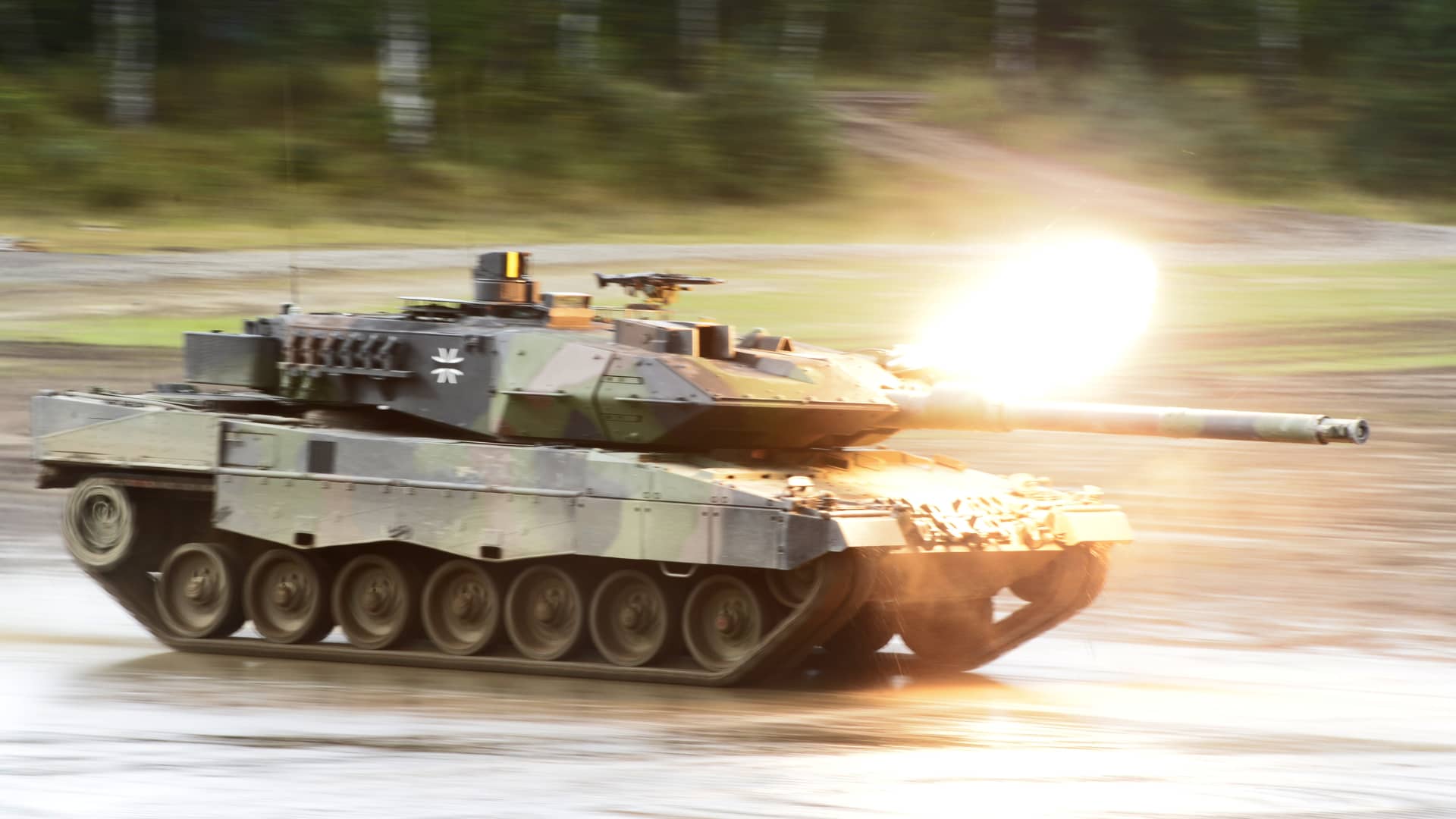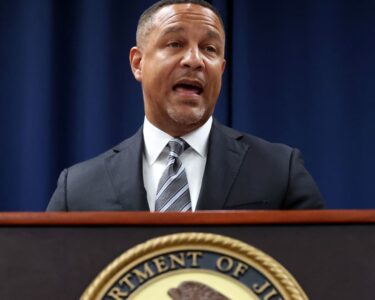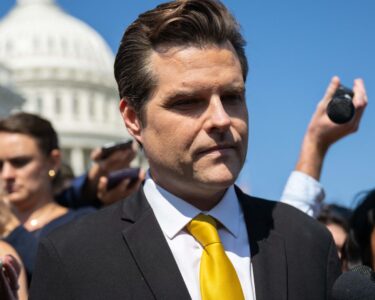This was CNBC’s live blog tracking developments on the war in Ukraine on March 28, 2023. See here for the latest updates.
The first shipment of German and British tanks have arrived in Ukraine, ahead of an expected spring counter-offensive.
Ukraine’s defense ministry said British Challenger 2 tanks had arrived in Ukraine, while Germany’s Defense Ministry said 18 Leopard 2 tanks, ammunition and spare parts had been sent Tuesday.
Germany has faced criticism during the war for an apparent reluctance to send heavy weaponry to Ukraine. It eventually decided to send battle tanks to Kyiv in January, with the U.S. also pledging to send tanks. The U.K. was the first country to pledge tanks to Ukraine early on in the new year.
In other news, Russia’s Pacific Fleet fired supersonic anti-ship cruise missiles at a mock target in the Sea of Japan, the Russian Defense Ministry said Tuesday. The combat exercise saw Russia fire Moskit cruise missiles — supersonic anti-ship cruise missiles — at a “mock enemy.” It said the target was hit.
Japan’s foreign minister said his country would remain vigilant against Moscow’s military operations.
European Union countries agreed to seek a legal option to stop Russian companies sending liquefied natural gas to EU nations, by preventing Russian firms from booking infrastructure capacity.
EU countries’ energy ministers proposed that new EU gas market rules should include the option for governments to temporarily stop Russian and Belarusian gas exporters from bidding up-front for capacity on the infrastructure needed to deliver LNG into Europe.
The proposal is part of countries’ negotiating position on new EU gas market rules. It must be negotiated with the European Parliament – a process that can take months.
The 27-country EU has pledged to ditch Russian gas in response to Moscow’s invasion of Ukraine. Europe’s pipeline imports of gas from Russia have plunged since the invasion, but LNG imports have increased.
— Reuters
The United States has not seen any indications that Vladimir Putin is getting closer to using tactical nuclear weapons in his war on Ukraine, just days after the Russian leader said he was moving such weapons into Belarus.
“We’re watching this as best we can. We haven’t seen any movement by Mr. Putin to act on what he pledged he would do,” White House spokesperson John Kirby told reporters about Putin’s statement on Belarus.
“And we haven’t seen any indications that Mr. Putin is leaning towards or getting closer to or indicating any preparations for the use of tactical nuclear weapons in Ukraine.”
— Reuters
Norway said it will prioritise a smooth transition with Russia as it plans to assume the chair of the Moscow-helmed Arctic Council on May 11, but will not commit to restarting stalled cooperation given the Russian invasion of Ukraine.
The Arctic Council was created in 1996 to discuss issues affecting the polar region, ranging from pollution to local economic development to search-and-rescue missions.
Norway announced its priorities, noting it would focus its work as chair on climate change, the oceans, sustainable economic development and the peoples of the Arctic.
The Arctic Council comprises the eight Arctic states of Russia, the United States, Canada, Finland, Norway, Iceland, Sweden and Denmark. Other nations, including China and India, are official observers to the council’s activities.
— Reuters
A Russian who was investigated by police after his daughter drew an anti-war picture at school was sentenced to two years in a penal colony on charges of discrediting the armed forces.
But the whereabouts of the convicted man, Alexei Moskalyov, were unclear. The court said in an official posting on VKontakte, similar to Facebook, that he had fled from house arrest.
Moskalyov has been separated from his 13-year-old daughter Masha since he was placed under house arrest at the start of this month and she was moved to a children’s home in their hometown of Yefremov, south of Moscow.
The case has provoked an outcry among Russian human rights activists and sparked an online campaign to reunite father and daughter.
— Reuters
A deal to protect Europe’s largest nuclear power plant from a catastrophic accident due to fighting in Ukraine could be “close,” the head of the International Atomic Energy Agency said, but warned that intensified combat in the area has increased risks to the facility.
In an interview with The Associated Press a day before he was to cross the front lines for a second time to visit the plant, IAEA Director General Rafael Mariano Grossi said he felt it was his duty to ramp up talks aimed at safeguarding the facility. He met Monday with Ukrainian President Volodymyr Zelenskyy and said he would “most probably” head to Russia in the coming days.
“There is an increased level of combat, active combat” in the area of the Zaporizhzhia Nuclear Power Plant, Grossi said. “My teams there report daily about the attacks, the sound of heavy weaponry. This is practically constant.”
Grossi has long called for a protection zone to be set up around the plant, which is very near the front line of the war. But so far, an agreement has been elusive.
“It is a zone of extreme volatility. So the negotiations are, of course, affected by the ongoing military operations,” Grossi said. “I would not characterize the process for the last few months as one that has not led to any progress.”
— Associated Press
Ukraine’s President Volodymyr Zelenskyy visits positions of Ukrainian border guards near the border with Russia in the Sumy region.
— Ukrainian Presidential Press Service | Reuters
“Attention. Air raid alert,” the voice says with a Jedi knight’s gravitas. “Proceed to the nearest shelter.”
It’s a surreal moment in an already surreal war: the grave but calming baritone of actor Mark Hamill, Luke Skywalker of “Star Wars,” urging people to take cover whenever Russia unleashes another aerial bombardment on Ukraine.
The intrusion of Hollywood science-fiction fantasy into the grim daily realities of war in Ukraine is a consequence of Hamill’s decision to lend his famous voice to “Air Alert” — a downloadable app linked to Ukraine’s air defense system. When air raid sirens start howling, the app also warns Ukrainians that Russian missiles, bombs and deadly exploding drones may be incoming.
“Don’t be careless,” Hamill’s voice advises. “Your overconfidence is your weakness.”
The actor says he’s admired — from afar, in California — how Ukraine has “shown such resilience … under such terrible circumstances.” Its fight against the Russian invasion, now in its second year, reminds him of the “Star Wars” saga, he says — of plucky rebels battling and ultimately defeating a vast, murderous empire. Voicing over the English-language version of the air-raid app and giving it his “Star Wars” touch was his way of helping out.
— Associated Press
A Russian man who was investigated by police after his daughter drew an anti-war picture at school was sentenced on Tuesday to two years in a penal colony after being convicted of discrediting the armed forces, the OVD-Info rights group said.
Alexei Moskalyov has been separated from his daughter Masha since he was placed under house arrest at the start of this month and she was moved to a children’s home in their hometown of Yefremov, south of Moscow.
The case has provoked an outcry among Russian human rights activists and sparked an online campaign to reunite father and daughter.
Moskalyov was convicted over comments he himself had posted online about the war in Ukraine. But the investigation started after Masha, 12, drew a picture last April showing Russian missiles raining down on a Ukrainian mother and child, prompting the head of school to call the police.
Police began examining Moskalyov’s social media activity and he was initially fined 35,000 roubles ($460) for comments critical of the Russian army.
In December, investigators opened another case against him on suspicion of discrediting the armed forces, this time based on a social media post in June.
The banned Russian human rights group Memorial said it considered Moskalyov to be a political prisoner.
A lawyer for the family visited Masha on Tuesday in a children’s home and came away with drawings she had made for him. He was also allowed to photograph a letter she had written him that read “Dad, you are my hero”, according to a video posted by the independent news outlet SOTAvision.
Shortly after invading Ukraine last year, Russia passed laws against discrediting the armed forces or knowingly spreading false information about them, with a maximum sentence of 15 years in jail.
— Reuters
The Kremlin said it would keep demanding an international investigation into explosions that affected the Nord Stream gas pipelines under the Baltic Sea last year.
Kremlin spokesman Dmitry Peskov said that “everyone should be interested in an objective investigation involving all interested parties.”
“All those who can shed light on the customers and perpetrators of this terrorist act. We consider this extremely important,” he said.
Peskov’s comments came after Russia on Monday failed to get the U.N. Security Council to approve its bid for an independent inquiry into the Nord Stream gas explosions that damaged the pipelines last September. The subsea pipelines were designed to bring gas from Russia to Germany.
“We regret that our initiative did not pass. But of course, the Russian side will continue its efforts not to silence this topic,” Peskov said.
Germany, Denmark and Sweden, who are carrying out their own individual investigations into the incidents, said last month in a joint letter to the Security Council that they believed the explosions were a result of sabotage.
But Russia has complained that it has been sidelined by international investigations into the explosions and doubts the “transparency” of ongoing inquiries into the cause of the damage.
Asked Tuesday what other options Moscow could pursue, Peskov said, “It is hardly possible to answer specifically, but we will do everything in our power to continue to insist and initiate such an international investigation.”
— Holly Ellyatt
Civilians receive humanitarian aid and drinking water from volunteers in Chasiv Yar, Ukraine.
– Ignacio Marin | Anadolu Agency | Getty Images
The pro-Russian leader of separatists in Donetsk said Tuesday that Russian forces are advancing in the east Ukrainian city of Bakhmut.
Denis Pushilin, the Russian-installed head of the self-styled “Donetsk People’s Republic,” told a Russian TV channel that Russian fighters have almost taken complete control of a metals plant in Bakhmut.
He said fighters in the Wagner Group private military company, who have been fighting to take control of Bakhmut for months, were “working hard” and “confidently,” Pushilin said on the Soloviev Live TV channel on Tuesday, news agency TASS reported.
Pushilin said such forces were creating “unbearable conditions” for Ukraine’s armed forces and making it hard for them to supply their troops.
“They have created impossible conditions for the enemy to even carefully try to bring in combat equipment, bring in reserves, or take out even the wounded. All this is extremely difficult,” he said, because all the roads are under Russian control, he claimed.
Russia was seen to be making progress in its conquest of Bakhmut in the last few months but in recent weeks, defense analysts have said its forces appeared to be losing momentum.
There has also been speculation that the Wagner Group leader, Yevgeny Prigozhin, who has had a high-profile dispute with Russia’s defense ministry, could be ready to pull his fighters out of the area, though he denied that suggestion.
Ukraine is gearing up for an expected counter-offensive although it has said it needs more weaponry from its Western allies before it launches fresh assaults to reclaim lost territory in eastern and southern Ukraine.
— Holly Ellyatt
Possible drone attacks against key energy infrastructure are a serious threat to Russia’s energy security, Energy Minister Nikolai Shulginov said on Tuesday.
Shulginov did not mention Ukraine by name, but Russia says it has foiled a number of attempted Ukrainian drone attacks in recent months.
Ukraine has not publicly acknowledged launching attacks against targets inside Russia, but senior officials in Kyiv have on occasion appeared to welcome the news of successful drone attacks on Russian soil.
“The key threat now is acts of illegal interference through the use of unmanned aerial vehicles (UAVs),” Shulginov said during a roundtable discussion where he addressed the security of Russia’s energy facilities.
He said he was cooperating with Russia’s defence ministry and FSB security service on the issue.
Russia has previously reported drone attacks in several towns and cities, some of them hundreds of kilometres (miles) from its border with Ukraine.
On Sunday, Russia’s defence ministry said it had halted a UAV attack in a town 220 km (140 miles) south of Moscow, bringing down the drone over residential houses in the town of Kireyevsk.
Russia accused Ukraine of mounting drone attacks on air bases deep inside Russian territory in December, including the main base for strategic bomber planes near the city of Saratov, after flying hundreds of kilometres through Russian airspace.
Russia itself has launched waves of missile and drone strikes against Ukraine’s energy infrastructure over the last six months of the conflict, often knocking out power for millions of civilians across Ukraine.
— Reuters
Belarus’ Foreign Ministry said Tuesday that it had decided to host Russia’s tactical nuclear weapons reportedly because of NATO’s “coercive measures” and “the build-up of military potential” in neighboring countries.
“Unilateral coercive measures in politics and the economy are accompanied by the build-up of military potential in the territory of neighboring countries — NATO members in close proximity to our border,” Belarus’ Foreign Ministry said in a statement, reported by Russian news agency Tass.
“Considering these circumstances and the legitimate concerns and risks in the field of national security arising from them, Belarus is taking forced response actions to strengthen its own security and defense capability,” the ministry said.
Russia’s ally Belarus is seen as something of a bulwark for Moscow against NATO, given that it borders Poland, Lithuania and Latvia — all NATO members — and Ukraine to the south, and Russia to the east.
Over the weekend, Russia announced that it would locate tactical nuclear weapons (designed for use on the battlefield rather than mass wholescale destruction) within Belarus, saying President Alexander Lukashenko had made the suggestion to do so.
Minsk and Moscow both insisted the plans would not contravene international non-proliferation agreements, saying the U.S. already did the same thing with its allies and that Belarus would not have control over the weapons.
NATO criticized Russia’s nuclear rhetoric, calling it “dangerous and irresponsible.”
— Holly Ellyatt
Ukraine’s Defense Ministry said Tuesday that British Challenger 2 battle tanks have arrived in the country.
Ukrainian Defense Minister Oleksii Reznikov said on Twitter that the tanks had arrived in the country but did not specify when. The tweet included a video of Reznikov trying out one of the tanks.
“It was a pleasure to take the first Ukrainian Challenger 2 MBT for a spin. Such tanks, supplied by the United Kingdom, have recently arrived in our country,” Reznikov wrote.
The U.K. was the first country to agree to send battle tanks to Ukraine, before Germany and the U.S. decided in January to send their own heavy tanks. The first shipment of German-made Leopard 2 tanks arrived in Ukraine Tuesday, Berlin’s Defense Ministry said.
— Holly Ellyatt
Russia’s Pacific Fleet fired cruise missiles at a mock target in the Sea of Japan, the Russian Defense Ministry said Tuesday.
In a post on Telegram, the ministry said two of its ships were involved in the exercise that saw it fire Moskit cruise missiles — supersonic anti-ship cruise missiles — at a “mock enemy” target at sea.
“The target, located at a distance of about 100 kilometers [62.1 miles], was successfully hit by a direct hit from two Moskit cruise missiles,” the ministry claimed, saying the combat exercise was carried out safely. It did not state which ships had taken part in the exercise.
Japan’s Foreign Minister Yoshimasa Hayashi said Tokyo will stay vigilant against Moscow’s military operations, Reuters reported. He added that no damage was reported after the missile launches.
“As Russia’s invasion of Ukraine continues, Russian forces are also becoming more active in the Far East, including Japan’s vicinities,” Hayashi told a regular press conference, the news agency said.
When asked about Russia’s plans to station tactical nuclear weapons in Belarus, Hayashi said Japan condemned the move and demanded Russia and Belarus stop “such an action that would further increase tensions.”
— Holly Ellyatt
The first shipment of German Leopard 2 tanks, much-awaited by Ukraine, has arrived in the war-torn country, Germany’s defense ministry said Tuesday.
Eighteen of the tanks, ammunition and spare parts, as well as two “Buffalo” armored recovery vehicles arrived in Ukraine, the ministry said in a statement. In addition, 40 Marder infantry fighting vehicles have also reached Ukraine.
“As promised, our tanks arrived on time in the hands of our Ukrainian friends. I am sure that they can do something important at the front,” Defense Minister Boris Pistorius commented, adding that “Germany even delivered four more tanks than initially planned. You can rely on us.”
The ministry said that Leopard 1 A5 tanks will also be delivered to Ukraine in the near future but that those are currently being repaired by German industry, with the repair financed by Germany, Denmark and the Netherlands.
The aim is to have the first 25 tanks available by summer, around 80 by the end of the year and to increase to at least 100 Leopard 1 A5s over the course of 2024, the ministry said.
The Bundeswehr, Germany’s armed forces, has spent the last two months training Ukrainian soldiers on the weapon systems at a site near Munster, Germany. Nonetheless, Berlin has been singled out for criticism during the war, accused of not doing enough to help Ukraine, and of being slow to decide on giving Kyiv heavy battle tanks.
On the heels of German Chancellor Olaf Scholz’s decision in January to provide Ukraine with Leopard 2 tanks, the Biden administration announced it will equip Ukraine with the mighty M1A1 Abrams tank.
The 31 M1A1 Abrams tanks will expand on the more than $27 billion the U.S. has committed to Kyiv’s fight since Russia invaded more than a year ago.
— Holly Ellyatt, Amanda Macias
A view of Ukrainian soldiers of the 80th Brigade on the front line near Bakhmut as the war with Russia drags on:
— Diego Herrera Carcedo | Anadolu Agency | Getty Images
The White House said that it has not seen evidence that the Kremlin plans to use nuclear weapons in Ukraine despite Russian President Vladimir Putin’s recent that Russia would deploy “tactical nuclear weapons” to Belarus.
“We are continuing to monitor this very, very closely,” National Security Council spokesman John Kirby told reporters on a conference call. He added that so far, the U.S. has not seen reason to change its own nuclear posture.
Earlier this month, U.S. intelligence chiefs warned that Putin is likely to further upgrade the Kremlin’s arsenal of long-range nuclear-capable missiles in order to deter Kyiv and its powerful Western allies.
“Heavy losses to its ground forces and the large-scale expenditures of precision-guided munitions during the conflict have degraded Moscow’s ground and air-based conventional capabilities and increased its reliance on nuclear weapons,” the intelligence community wrote in an unclassified 35-page intelligence assessment.
— Amanda Macias
Officials from Poland and the European Union discussed artillery munitions manufacturing as part of a new, 2 billion euro ($2.2 billion) program to supply Ukraine in its war against invading Russian forces and to replenish Europe’s dwindling stocks.
EU Internal Market Commissioner Thierry Breton visited DEZAMET S.A. munition plant in Nowa Deba, in southeast Poland, accompanied by Polish Prime Minister Mateusz Morawiecki and Defense Minister Mariusz Blaszczak.
The visit came just days after Brussels announced a program to reimburse countries offering artillery ammunition to Ukraine from a 1 billion euro ($1.1 billion) fund. The program also aims to spend an equal amount on increasing production in 11 countries with such manufacturing capacity.
Breton said the EU is “determined” to quickly do what is needed in light of a conflict that’s expected to drag on. He also encouraged other EU countries to transfer ammunition to Ukraine as soon as possible.
— Associated Press
At least two people died and 25 were injured following Russian shelling on the city of Sloviansk in Donetsk.
Administrative office buildings, a high-rise building and seven residences were destroyed by S-300 rockets, Pavlo Kyrylenko, the head of the Donetsk Regional State Administration, said on Telegram.
He said a rescue operation was ongoing.
— Amanda Macias
Intense attacks on the eastern Donetsk town of Avdiivka and the damage they’ve caused prompted a Ukrainian official to liken the destruction to what you would see in a “post-apocalyptic” movie.
Utility workers were evacuated from Avdiivka, a town just over 50 miles southwest of Bakhmut in eastern Ukraine, as fighting intensified at the weekend.
“Avdiivka is becoming more and more like a site from post-apocalyptic movies … Therefore, a difficult decision was made to evacuate the rest of our heroes — utility workers who at least tried to keep the city clean and livable,” Vitaliy Barabash, head of the Avdiivka City Military Administration, said on Telegram Sunday.
Barabash told any remaining residents to leave the town while they were still able to, saying: “so now I do not ask, I strongly recommend leaving Avdiivka, because Russian rockets and projectiles do not spare anyone or anything, no matter what views you hold,” he said.
Ukrainian military officials have already warned that the town could be a “second Bakhmut,” where there has been heavy fighting for over seven months.
On Monday, Ukraine’s general staff said Russia was concentrating its offensives around Lyman, Bakhmut and Avdiivka and two other settlements, and added that its forces had repelled more than 60 attacks in the past 24 hours along the eastern front.
— Holly Ellyatt
NATO and Ukraine’s Western allies have expressed dismay at Russia’s announcement at the weekend that it will station tactical nuclear weapons in Belarus.
Russian President Vladimir Putin announced the move on Saturday, saying a deal had been struck with his ally Belarusian President Alexander Lukashenko, a leader who is seen as subservient to Moscow.
Putin claimed Lukashenko had long asked for the weapons to be stationed in Belarus, a country that borders NATO member Poland.
The Russian president said 10 aircraft that are capable of carrying tactical nuclear weapons had already been moved to Belarus and that the construction of storage facilities for the weapons in Belarus would be completed by July 1.
A spokesperson for the Western military alliance NATO responded to the move by branding “Russia’s nuclear rhetoric” as “dangerous and irresponsible,” while the EU’s foreign policy chief Josep Borrell urged Belarus not to host Russian nuclear weapons, commenting on Twitter that “Belarus hosting Russian nuclear weapons would mean an irresponsible escalation and threat to European security.” Borrell also warned of sanctions against Minsk.
A senior Ukrainian official, meanwhile, said the Kremlin had taken “Belarus as a nuclear hostage” and is looking to destabilize Belarus with the deal.
Defense experts and academics argue over the term, but “tactical” nuclear weapons generally refer to weapons designed to be used on the battlefield for specific tactical gains, rather than for the all-out destruction of larger targets like cities.
In announcing the move, Putin insisted the plan did not violate non-proliferation agreements as the weapons would be under Russian control.
“There is nothing unusual here either: firstly, the United States has been doing this for decades. They have long deployed their tactical nuclear weapons on the territory of their allied countries,” Putin said.
“We agreed that we will do the same -— without violating our obligations, I emphasize, without violating our international obligations on the nonproliferation of nuclear weapons.”
— Holly Ellyatt
Russia stirs outrage with plan for tactical nukes in Belarus; Ukrainian town now ‘post-apocalyptic’






